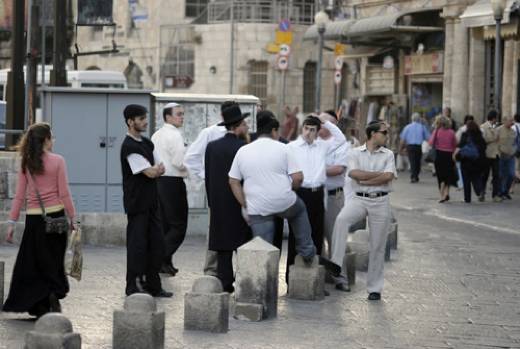Interfaith Group
Related: About this forumReligion in Israel: secularization Israeli-style bends rather than fights religious regulations
http://religion.info/english/articles/article_604.shtml#.UUtJu6Wlo20Richard Cimino - Religion Watch
20 Mar 2013
Israel may remain an officially Jewish state, with no “church”-state separation, and with an orthodox majority with a presence in politics and strong religious attachments, but the country is experiencing a “secularization below the radar,” said Guy Ben-Porot, a political scientist at Ben-Gurion University at a recent meeting at Columbia University in New York.

Young people at Jaffa Gate, in Jerusalem (© Susan Law Cain | Dreamstime.com).
Ben-Porot, whose presentation was based on his new book Between State and Synagogue (Cambridge University Press), said that religious and rabbinical authority is declining in Israel because of demographic changes and as secular and non-orthodox Israelis are finding novel ways to skirt laws and observances involving the Sabbath, kosher food, and marriage. He said that many of these changes are “not on the books or official” and are not related to promoting a secular ideology or engaging in politics.
The conflicts between secular and religious Israelis grew especially in the 1980s and 1990s with the formation and growing influence of orthodox political parties. Secular and other non-Orthodox Israelis attempted to use political means or to appeal to the liberal Supreme Court to battle such influence was largely unsuccessful, according to Ben-Porot. Rather it has been the changes in Israel's population and in Israelis' lifestyles that may pose the biggest challenge to traditional religious influence.
The influx of immigrants from the former Soviet Union (FSU) during the last two decades has added to Israel's secular climate since many of these newcomers are defined as non-Jewish by the orthodox (largely because of having non-Jewish mothers). Since their marriages cannot be certified by orthodox authorities, many of these FSU Israelis citizens go to Cyprus to have their wedding ceremonies. Cohabitation, which has tripled in 15 years in Israel, has also been a way of circumventing religious marriage laws.
more at link
Meshuga
(6,182 posts)Secular Jews are the largest block of the population, followed by the masorti type (who are non-orthodox religious Jews), and the smaller group is the orthodox at about 20%.
The problem is that the orthodox population is growing (especially the ultras) given their high birth rate. But the orthodox are a minority who were given power over religious matters in Israel and that causes a lot of problems not only for secular Jews but also for the vast majority of religious Jews.
Fortinbras Armstrong
(4,473 posts)However, you must remember that Israeli governments are always coalitions. Indeed, due to the proportional voting system for the Knesset, there has never been a majority government in the history of Israel. The Orthodox parties are often willing to join these coalitions, generally on the right. However, if they do, the price includes a seat in the cabinet, specifically the Ministry of Religious Affairs. (Note, this is a considerable simplification. For example, the Ministry was dissolved some years ago, but has been re-constituted.)
The Ministry of Religious Affairs determines such questions as "who is a Jew?" "What resources should go to yeshivas?" "Should the Orthodox be conscripted?" and so on.
Meshuga
(6,182 posts)And I am aware of their system of government and politics.
I just thought it was weird that the article claimed that the orthodox were a majority.
Regarding the ministry of religious affair, I know at least one case where the son of a congregant in my synagogue could not get married in Israel since his mother converted to Judaism via a reform rabbi.
So he wasn't considered a Jew according to the orthodox leadership in Israel.
Groups like IRAC, which I proudly donate to, have been created to fight these battles in favor of religious plurality in Israel. And some recent battles have been won since the non-orthodox community pretty much said that if Israel is an "orthodox Jewish state" as opposed to a "Jewish state" then Israel will not get the support from the non-orthodox in the diaspora. And I think the message has been received.